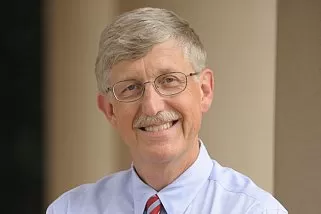
OITE was lucky enough to recently connect with the Director of the National Institutes of Health, Dr. Francis Collins. He offers valuable tips from his own life and experiences. This is a must read for all, especially scientists just starting out in their careers.
You are well known for your hobbies (music and motorcycles to name two) on top of your professional accomplishments. How do you maintain all of your varied vocational and avocational interests?
I wish I could say that’s because I am a master of time management and work-life balance. But I can’t really claim credit for either. What I will claim is that engaging in such activities outside of work helps me nurture that other part of me that longs for adventure and inspiration, and gives me a chance (especially with music) to create something of beauty (well, at least sometimes). The uplift from those experiences helps me perform better in my work life.
Science isn’t always seen as the most welcoming/friendly environment in terms of work-life balance. Has this been a challenge in your career? If so, how have you coped?
Yes, achieving that balance is indeed a challenge for those of us working in science. As NIH Director and PI of an intramural lab, my work demands can tend to soak up every waking hour, and some that should be sleeping. And sometimes I let that get the best of me. It helps me to have a life partner and soulmate (my wife Diane) who is much more balanced than I am and who is masterful in diagnosing and treating the work monomania when it gets out of hand.
Do you regularly engage in any self-care (body/mind/spirit/heart) strategies?
My spiritual life is really important to me – and so I spend a little time most mornings in Bible reading and reflection. I’m also in a men’s book club with several other non-science professionals who are interested in how faith is relevant to modern life – that has been a wonderful source of shared growth. And then there’s health. Ten years ago, I realized I was doing a poor job of health maintenance – no exercise, terrible diet. A DNA test pointed to a higher than average risk of diabetes, a disease my lab works on and that I really don’t want to get. I hired a personal trainer, stopped indulging so much in pastries and ice cream, and lost 30 pounds. Those pounds have never come back – and that same trainer comes to my house twice a week at 5:45 AM to put me through an intense hour of weight and cardio training. The effect of both the spiritual and physical training on my sense of wellbeing has been significant.
What advice do you have for scientists just starting out on their career paths for maintaining their own self-care?
It sounds like a cliché – but it’s important to make self-care a priority, not an afterthought. Choose activities that really enhance your joy in life; they will be easier to sustain. Find like-minded people to share those experiences, whether it’s a dance class, a softball league, or a book club – it’s too easy to decide you just don’t have time for something if there’s no one else involved. The chance to do science is an incredible privilege, but it can also be very exhausting. Figure out what kind of fuel your tank needs, and then make sure to fill it often enough to keep the engine going!
As shown by Dr. Collins, wellness is more than just one thing. Remember to prioritize your own wellness and self-care by taking advantage of the resources and activities near you. If you are at the NIH, the OITE offers many workshops and drop-in groups on topics such as: resilience, assertiveness, and stress management to name a few. Many university campuses and community organizations provide similar offerings through student life services or recreational groups.




